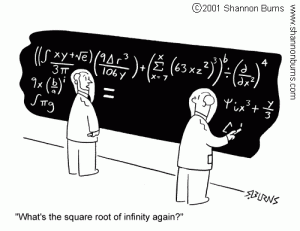I spent the weekend at an alumni event for my college debating group. In the wee hours of the morning, a fellow transhumanist and I were arguing with a rather tipsy post-modernist. PoMo guy was arguing we couldn’t justifiably wish to live forever or even to live too long, since, without death, there could be no need to leave a legacy after us, and, thus, the drive to create would be annihilated. (If people are interested, I can write up my counterargument in a different post).

As part of our response, my transhumanist friend and I brought up the claim that, by induction, everyone wants to be immortal. Today, I wish to be alive and in good health tomorrow. Tomorrow, I will have the same wish for the day after tomorrow, etc. The post-modernist’s eyes went wide and he told us intently, “I could maybe be ok with that. Are you saying that you would live an infinite time, but that time would be countably infinite?”
I can share no further insights from this discussion, because my transhumanist partner and I collapsed in giggles and nothing more could be gotten out of us except, “I aspire to be uncountably immortal!” “I shall be two-to-the-aleph-null immortal!” “My immortality will be undiagonalizable!”
There are a couple lessons to draw here. First: my college friends throw excellent parties. Second: laypeople tend to get themselves in trouble fast when they speak casually about infinity.
Anyone making claims about God tends to get tangled up in questions of infinity sooner or later, and Marc of the Bad Catholic blog here at Patheos got into the topic in “In Defense of Stupid Conversions (God Exists!)” — a post arguing that Beauty is persuasive evidence for God. I’m not addressing the whole post, just the bit my math-geek mind latched on to, so you should read his whole post to properly understand his argument. Here’s the bit I want to talk about:
If Beauty can indeed be maintained to be an Infinite, Supernatural Existence, then God is Beauty. For there cannot exist two independent infinities. An immovable object and an unstoppable force cannot meet. Another way of saying this is that God is infinitely beautiful, which as I showed in the train example, is the same as saying God is Beauty…
So when Francis Collins falls to his knees before the sight of a gorgeous, frozen waterfall, it isn’t emotionalism. It isn’t weakness. For all practical purposes, it seems to be basic mathematics. The existence of Beauty declares the existence of God, for Beauty, in it’s infinity is God. Any experience of beauty, whether experienced by the hardcore atheist or the flabby-minded Christian, is an experience of God.
There can totally exist two independent infinities. Let’s go back to the idea of countable vs. uncountable numbers. The set of natural numbers (1,2,3,4,……) is infinite and countable. A set is countable when, well, you can count along it. I’ll never reach the end, but I can move from one number to the next in a sequence.
An uncountable infinity is something like the set of real numbers (whole numbers, fractions, transcendentals like pi — it’s pretty much the whole number line). There’s no way for me to count along this set. If I decide I’m starting at zero, where should I go next? 0.1? 0.0001? pi/100,000,000?
These two infinities are not equivalent (you can’t match the elements of one with the elements of the other). So if you want to claim that Beauty must be God, you’re going to need are argument that goes beyond the idea that both concepts are infinite. If you’re a math person, you want to claim that there’s a bijection between the two ideas. If you’re a layperson, you still want to claim that, but since you don’t know the jargon, what you say is that the two infinities are identical or that each one contains the other. And, as the example of countable and uncountable sets shows, just because two quantities are infinite does not mean they are interchangeable.
Maybe what Marc meant was that there can’t be two independent unities (which I’m using here to denote some concept that contains everything). There can only be one example of the set that includes all sets including itself. Anything else that met the definition would be identical to the one we’re already looking at.
If that’s the case he’s making, I think I’d need more to convince me that Beauty was isomorphic (able to be mapped onto) the totality of the universe. That seems like a claim one could make about God, but even if you grant that Beauty is objective, I don’t think it gets you close enough to the claim that Beauty is Everything.












